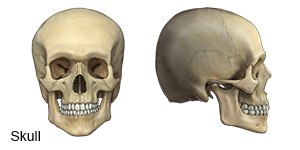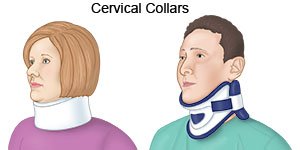Skull Fracture
Medically reviewed by Drugs.com. Last updated on Apr 6, 2025.
A skull fracture is a break in a bone in your head.
 |
DISCHARGE INSTRUCTIONS:
Call your local emergency number (911 in the US), or have someone else call if:
- You had a seizure.
- You suddenly feel lightheaded and short of breath.
- You have chest pain when you take a deep breath or cough.
- You cough up blood.
Seek care immediately if:
- You have blood or fluid coming out of one or both ears.
- You have worsening neck pain.
- You have eye pain or swelling around your eyes.
- One or both of your eyes begin to bulge.
- Your arm or leg feels warm, tender, and painful. It may look swollen and red.
Call your doctor or neurologist if:
- People close to you notice changes in how you act.
- You have a fever.
- You have a headache that does not improve after you take medicine.
- You have ear pain.
- You are vomiting.
- You have questions or concerns about your condition or care.
Drugs used to treat this and similar conditions
Risperidone
Risperidone is used to treat schizophrenia and symptoms of bipolar disorder. Learn about side ...
Amantadine
Easy-to-read patient leaflet for amantadine. Includes indications, proper use, special ...
Treatment options
The following list of medications are related to or used in the treatment of this condition.
Medicines:
You may need any of the following:
- Antibiotics prevent or treat a bacterial infection.
- Steroids help decrease swelling.
- Stool softeners make it easier for you to have a bowel movement. You may need this medicine to treat or prevent constipation.
- Take your medicine as directed. Contact your healthcare provider if you think your medicine is not helping or if you have side effects. Tell your provider if you are allergic to any medicine. Keep a list of the medicines, vitamins, and herbs you take. Include the amounts, and when and why you take them. Bring the list or the pill bottles to follow-up visits. Carry your medicine list with you in case of an emergency.
Activity:
You may need to rest in bed with your head raised for a period of time after your injury. Avoid straining, such as blowing your nose, sneezing, and lifting heavy objects. Straining may increase the pressure in your head. If fluid from around your brain is leaking, straining may worsen the leak.
A neck brace
may be needed to prevent you from moving your head and neck. A neck brace may be soft or hard and helps prevent further injury while your fracture heals. A neck brace may also help decrease neck pain. Ask for more information about a neck brace and about how to care for it.
 |
Rehabilitation
may be needed if you have problems with dizziness. You will learn activities that will help improve your balance and decrease your dizziness.
Follow up with your doctor or neurologist as directed:
Write down your questions so you remember to ask them during your visits.
© Copyright Merative 2025 Information is for End User's use only and may not be sold, redistributed or otherwise used for commercial purposes.
The above information is an educational aid only. It is not intended as medical advice for individual conditions or treatments. Talk to your doctor, nurse or pharmacist before following any medical regimen to see if it is safe and effective for you.
Learn more about Skull Fracture
Treatment options
- Medications for Head Injury
- Medications for Head Injury w/ Intracranial Hemorrhage and Loss of Consciousness
- Medications for Head Injury with Intracranial Hemorrhage
- Medications for Head Injury with Loss of Consciousness
Care guides
Symptoms and treatments
Further information
Always consult your healthcare provider to ensure the information displayed on this page applies to your personal circumstances.
